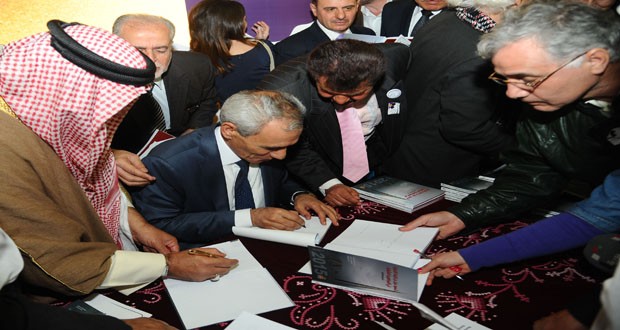“Eye Witnesses to the Armenian Genocide Under the Ottoman Empire”, a book by the Armenian Ambassador to Syria Arshak Poladian, was signed on Tuesday within a ceremony held by the Damascus-based Commission for Commemorating the 100th anniversary of the Armenian Genocide in cooperation with the Culture Ministry at al-Assad Library. Many politicians, men of religion, intellectuals, journalists and interested people attended the book signing ceremony.
The book, published by “al-Sharq House for Publication and Printing”, includes important selections from memoirs of three eyewitnesses to the genocide; Syrian lawyer Faez al-Ghusein, Na’eem Bek al-Turki and clergyman father Ishaq Armala al-Siriani. It presents documents and photos uncovering the atrocities committed by the Turkish leaders against the Armenian people under the Ottoman Empire early in the 20th century and which claimed the lives of a million and a half innocent Armenians.
By featuring the massacres of the Ottomans against the Armenians, the writer aims to shed light on the irresponsible behavior of the current Turkish government of the Justice and Development Party which keeps claiming its being the heir of the Ottoman Empire and even calls itself “the Neo-Ottomans”.
Poladian said in a speech during the ceremony that the genocide perpetrated by the Ottomans covered all Armenia. It was accompanied by arrest campaigns, executions, displacement, confiscation of properties and burning of Armenian villages and cities.
“That racial policy led to making the Armenian provinces empty of their original inhabitants and caused the elimination of entire generation of intellectuals, politicians, university professors,” Poladian clarified pointing out that the Armenian treasures, cultural heritage and history were looted and undermined by orders from the then Turkish officials like Tal’at Pasha, Anwar Pasha and Jamal Pasha.
The Armenian ambassador went on to say that “despite thousands of documents which confirmed the truthfulness of the genocide, the Turkish successive governments over the past 100 years, have avoid recognizing the genocide and refused to condemn it, rather they have put the whole issue within the framework of the Armenians’ support for Russia in the World War I regardless the fact that the Ottoman authorities had started the genocide policy before the WWI.”
 On his part, Dr. Sarkis Borenzesian made a speech on behalf of the Commission for Commemorating the 100th Anniversary of the Armenian Genocide stressing that the racial genocide, which continued from 1894 to 1923, undermined the civilization and the cultural monuments built by the Armenians over five centuries. It aimed at completely eliminating the Armenian people, eradicating their history and national cultural heritage, usurping their homeland and displacing them from the land of their forefathers.
On his part, Dr. Sarkis Borenzesian made a speech on behalf of the Commission for Commemorating the 100th Anniversary of the Armenian Genocide stressing that the racial genocide, which continued from 1894 to 1923, undermined the civilization and the cultural monuments built by the Armenians over five centuries. It aimed at completely eliminating the Armenian people, eradicating their history and national cultural heritage, usurping their homeland and displacing them from the land of their forefathers.
Borenzesian said that 2015 has been announced the year for commemorating the Armenian Genocide’s 100th anniversary in the Armenian Republic and the entire world. Activities and events within this framework will continue all over this year. April, 23rd and 24th, 2015 will be the most eventful stops because more than one hundred states will be invited to take part in the activities.
Syria’s Deputy Culture Minister Tawfeek al-Imam asserted the historical friendship between Syria and Armenia, pointing out that this relation will continue to be distinguished due to common geographical elements and history.
The 215-page book, which contains sad and painful stories, is the first of its kind as it reviewed several documents uncovering the policy adopted against the Armenians under the Ottoman Empire. It is also a contribution to documenting the memoirs of the eyewitnesses.
Director of Al-Sharq Publishing House, Nabeel Tou’meh affirmed that the world will recognize the right of the Armenian people who have important history and unique humanitarian presence in the world.
Born in “Ras al-Eyn” in the Syrian province of Hassaka, Dr. Arshak Poladian, is a professor at the Arabic Language Department of Yerevan University. He is a writer and researcher with many studies and research works through which he was keen on enhancing relations between the Armenians and the Arabs, particularly the Syrian people.
Among his works are, Studies in the History and Culture of the East, The History of the Armenian-Arab Relations and The Republic of Armenia.
Hamda Mustafa

